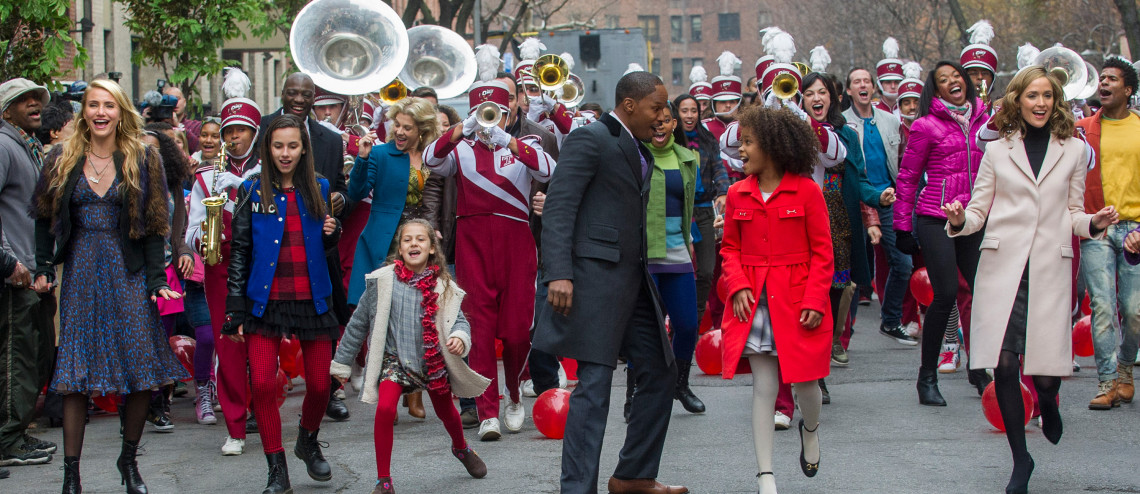It recently came to my attention that my fellow film critics don’t think much of John Huston’s massive, gargantuan 1982 adaptation of the Broadway musical Annie. Sadly, I must recuse myself from this particular conversation in accordance with my brilliant friend and colleague Ty Burr’s “Footie-Pajamas Movie Rule,” stating that one cannot have a viable critical opinion on any film first experienced while wearing bedclothes that covered your feet.
Having grown up in a household with two little sisters and a working VCR, Annie is beyond good and evil and simply just *is* and thus always was for me. This Depression-era tale of a plucky orphan who wins the heart of a curmudgeonly war profiteer and accidentally inspires the New Deal or something like that was so burned into my brain after so many countless viewings at such an early age, resistance is futile. (I still know all the words to “Tomorrow” as well as most of the other damn songs, and I’ll bet my bottom dollar that they’re all pretty great.)
Such a predisposed weakness for the source material made me perhaps the easiest of marks for the contemporary remake of Annie, starring Beasts of the Southern Wild’s Quvenzhane Wallis as our indomitable title character, bowling over the affections of a brusque billionaire (Jamie Foxx) running a Bloomberg-style campaign for mayor of New York. I was sincerely looking forward to this one, especially when I discovered it was directed by Will Gluck, whose Easy A and Friends With Benefits were a couple of the smarter, more pleasurable romantic comedies to roll off the assembly line in recent years.
So I’m sad to report that Annie is fucking terrible. It’s listless and incompetently staged, the talented cast giving barn-door sized performances while gasping away in a hermetic vacuum of dead air, snarky in-jokes, and limp musical numbers that stumble over tinny, ill-fitting and awkwardly included hip-hop beats. The choreography is all flailing arms and rictus grins, shrugging shoulders and running around circles instead of actual dancing. The vocals are half-assedly warbled and Auto-Tuned to death. As it rambled on. I honestly started to sorry for these performers.
In short, Annie is the second most embarrassing thing Sony did this week.
The story doesn’t even make sense anymore, with germ-phobic, generally tetchy, and unpleasant cell phone magnate Will Stacks (Foxx) pulling Wallis’ little orphan Annie out of the way of an oncoming car one day on a New York City street. A YouTube video of this encounter goes viral –the film is annoyingly obsessed with social media and Katy Perry’s Twitter feed plays a major supporting role– so Stacks’ cartoonishly mercenary campaign manager (Bobby Cannavale) convinces the candidate to take the child in for a spell to boost the poll numbers with a bunch of photo ops.
The feral power of her Beasts performance here replaced by a cloying child actor’s robotic quips, Wallis plays along. At least this gets Annie away from her hard-knock life in a foster home run by Cameron Diaz’s Colleen Hannigan, here reimagined as a boozy welfare queen who was kicked out of C + C Music Factory right before they hit it big and now stocks her squalid Harlem apartment with foster kids for government stipends.
There are few things in movies I find less appealing than Diaz in grotesque comedienne mode, mugging her face into contortions while pleading for laughs. This disastrous turn is in keeping with Gluck’s abject inability to keep any of these performers on the same page for any given scene. Foxx hasn’t seemed entirely present for a movie in a sad several years and phones this one in totally, absentmindedly warbling the film’s wealth-porn manifesto while flying around Manhattan in his helicopter but refusing to go above 96th Street. Cannavale brays like Chico Marx on meth, and the picture’s precious few genuine moments are landed courtesy of Rose Byrne, playing Foxx’s long-suffering semi-romantic love interest (Anne Reinking in the original) and stealing scenes the way she did in Neighbors this past summer.
Gluck can’t handle Annie’s big forthright gulp of sentimentality so instead he throws in a bunch of cheeky (not bad) in-jokes about surveillance culture and YA adaptations. But it’s disjointed and aesthetically ugly, wallowing in winking, rib-nudging, and every other trick cocky, insecure filmmakers pull whenever they want to feel like they’re better than their material. He even throws away the easiest moment, with Wallis Auto-Tuning her way through “Tomorrow” in a scene during which… Annie walks down the damn street. The song is already there, and it might have been a great moment if anybody could’ve been bothered to actually stage it.
I hear Huston was criticized for trying too hard with Annie. Well, here’s your answer to that.





















3 thoughts on ““Annie””
Pingback: ANNIE | SPLICED PERSONALITY
Pingback: BOFCA REVIEW ROUND-UP: 12/19/2014 | Boston Online Film Critics Association
That, Mr. Burns, is one hell of a fine piece of writing. I laughed, nodded my head in agreement and got more entertainment value out of the review than sitting through “Annie.” Great work.